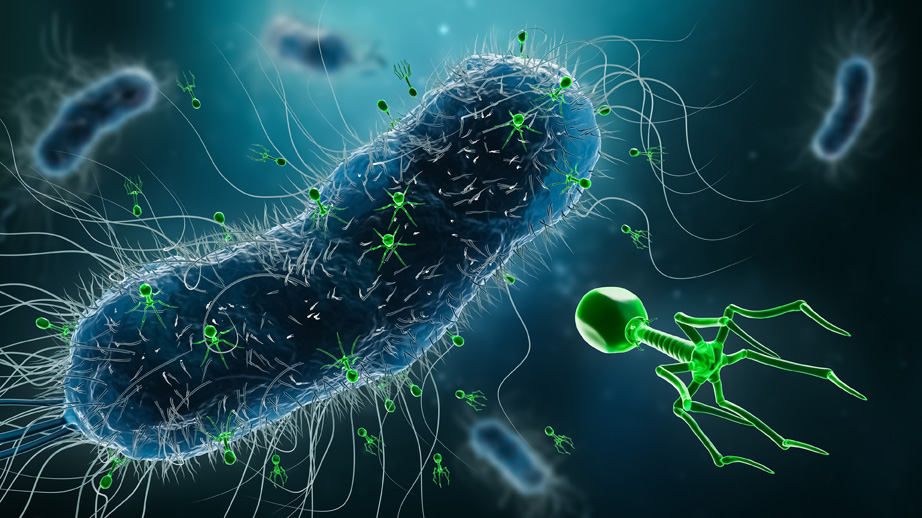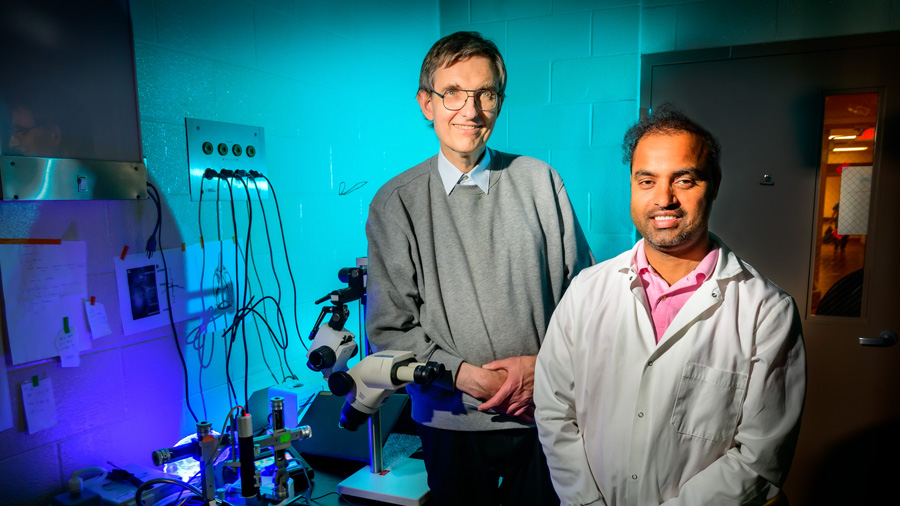Researchers from the University of Illinois Urbana-Champaign will partner with investigators from industrial and academic institutions, including Ginkgo Bioworks, Baylor University, University of Minnesota, Oregon State University, and Oregon Health & Science University, on a five-year initiative funded by the Advanced Research Projects Agency for Health and overseen by Program Manager Andrew Brack, PhD.
The project, “Microbe/phage Investigation for Generalized Health TherapY (MIGHTY),” aims to harness the natural predators of bacteria – known as phages – as precision tools to shape the human microbiome and promote health. “We are very excited to be hosting this project at the Carl R. Woese Institute for Genomic Biology,” said IGB Director Gene Robinson. “The new ARPA-H agency aims to fund creative, transformative ‘moonshot’ initiatives, and the MIGHTY project more than fits the bill. We look forward to the transformative research that this contract will enable.”
Our bodies contain trillions of bacteria that can influence our health. Many are beneficial, but disruptions in their numbers or invasion by pathogens can cause a variety of diseases. For decades, antibiotics have been our go-to defense against harmful bacteria, but they also indiscriminately kill the natural bacterial residents of the microbiome that are important for maintaining health. This often leads to microbiome imbalances, or dysbiosis, that can fuel chronic diseases. Meanwhile, antibiotic resistance continues to rise, compounding the global public health crisis.
A Precision Alternative to Antibiotics
Currently, there are few reliable tools that can restore the microbiome balance. Researchers are now turning to phages, the naturally occurring viruses that selectively infect and kill bacteria and already exist throughout the human body. Phages have potential transformative uses as precision antimicrobials because they target specific pathogens while leaving beneficial bacteria unharmed. However, the process of isolating phages from the environment for therapeutic purposes is currently slow and inefficient, and single-phage treatments often fail due to rapid bacterial resistance, leaving the generalized use of phages still out of reach.
Overcoming these challenges, the MIGHTY team will create a platform that enables rapid isolation of bacteria and phages at an unprecedented scale and apply mechanistic modeling and artificial intelligence/machine learning methods to identify effective phage combinations that eradicate harmful bacteria.
Starting with Oral Health – And Reaching Further
As an initial application, the team will focus on the oral microbiome where bacterial pathogens drive tooth decay and gum disease, and also contribute to chronic illnesses, including cardiovascular disease, Type II diabetes, and oral and colorectal cancers. The researchers aim to develop an easy-to-use, low-cost phage product – such as a chewable gummy – that can improve oral health for everyone.
“Within the MIGHTY team, my group is responsible for mapping the landscape of the phages found in the oral biome and identifying phages that show promise as a target for the development of a product that reduces dental disease,” said Christopher Gaulke, assistant professor of pathobiology at the University of Illinois College of Veterinary Medicine and an affiliate of IGB in the Microbiome Metabolic Engineering research theme.
“This is the very beginning of precision microbiome editing to promote health,” he said. “Knowledge gained through this study will likely yield many additional applications for human and animal health.”
The team will leverage researchers’ deep expertise in bacterial genetics, phage biology, microbiome studies, computational biology, and machine learning, and integrate cutting-edge technologies, such as Ginkgo’s ultra-high-throughput screening technology, and activity-based chemical probes developed at Baylor.
The illustration depicts a group of bacteriophages (in green) infecting a bacterium.




